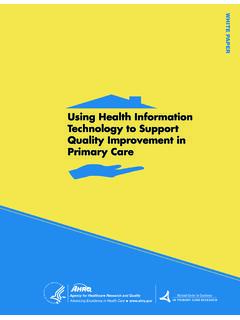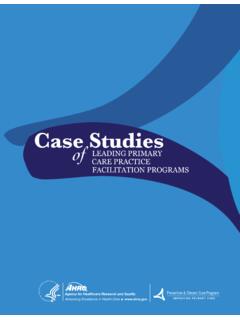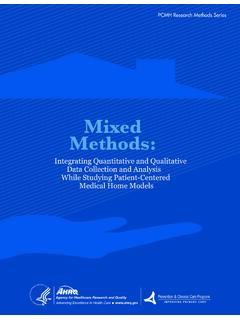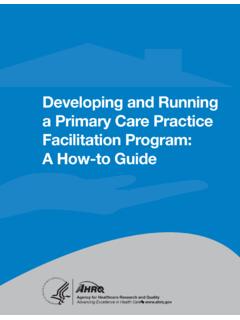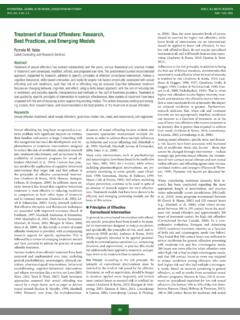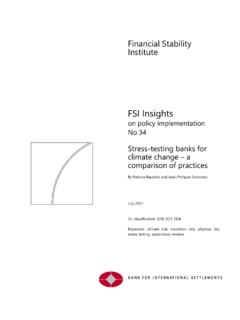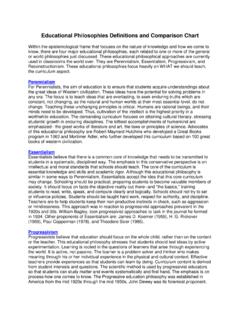Transcription of Anthropological Approaches: Uncovering Unexpected …
1 PCMH Research Methods Series Anthropological approaches : Uncovering Unexpected Insights About the Implementation and Outcomes of Patient-Centered Medical Home Models Agency for Healthcare Research and Quality Prevention & Chronic Care Program c Advancing Excellence in Health Care IMPROVING PRIMARY CARE. Anthropological approaches : Uncovering Unexpected Insights About the Implementation and Outcomes of Patient-Centered Medical Home Models This brief focuses on using Anthropological approaches to evaluate patient-centered medical home (PCMH) models. It is part of a series commissioned by the Agency for Healthcare Research and Quality (AHRQ) and developed by Mathematica Policy Research under contract, with input from other nationally recognized thought leaders in research methods and PCMH models.
2 The series is designed to expand the toolbox of methods used to evaluate and refine PCMH models. The PCMH. is a primary care approach that aims to improve quality, cost, and patient and provider experience. PCMH models emphasize patient-centered, comprehensive, coordinated, accessible care, and a systematic focus on quality and safety. I. An Anthropological Approach The hallmark of anthropology is the exploration of the complexity and nuances of human interactivity and culture. As a research discipline, anthropology combines humanist and social science strategies. The method that sets anthropology apart from other disciplines is ethnography, the qualitative process of exploring in depth the whys and hows of human culture, behavior, and expression. Using this ethnographic method, anthropologists can uncover Unexpected insights that are best gained by studying a topic in person, in situ, over time, and from diverse perspectives.
3 The ethnographic method uses multiple data collection techniques including participant observation, interviews, focus groups, and textual analysis to construct a holistic and contextual view of the phenomena under study. During their research, anthropologists make observations and pursue perspectives from diverse angles and in diverse ways. They observe and talk with people from different social categories who have varying relationships to the phenomena under study and conceptualize and respond to those phenomena in unique ways. Anthropological inquiry combines information about people's thoughts gathered through interviews with information collected by observing their behavior and social interactions. In the context of the PCMH, this can include interviewing and observing doctors, nurse practitioners, office managers, and patients to explore the ways in which they experience and understand concepts such as care coordination or quality improvement.
4 Anthropologists immerse themselves in the rich, largely qualitative data set that results from their research and conduct iterative analyses to identify emerging themes and glean insights about the meaning of the data. The goal of an Anthropological approach is a credible interpretation of the data that is well described, provides valuable insights, and can be replicated. Anthropology has much to contribute to the field of PCMH evaluation, in which researchers aim to not only describe implementation and outcomes, but also uncover contextual meaning and reasons behind those descriptions within a rapidly evolving health care system. An Anthropological approach can help researchers evaluating the PCMH identify transformations, along with the underlying factors in the practice, among patients, and in the community that drive how transformation decisions are 1.
5 Made, how the changes occur, and how the changes affect those involved. The approach goes beyond examining quantitative outcomes to explore the qualitative aspects of how the practice is transforming, why particular changes are (or are not) occurring in a given primary care practice, and how all affected parties conceptualize and experience the changes. This approach necessitates investigation of issues from multiple perspectives and by multiple means, including collecting data as expressed by clinicians, other staff members, and patients. Anthropological evaluations are designed to identify the shared cultural meanings between and among different groups of stakeholders (such as providers, staff, and patients), and determine how culture is constructed at the practice. A longitudinal evaluation from an Anthropological perspective involves documentation of the dynamic change in practice culture and patients' interactions with this change as PCMH transformation initiatives unfold.
6 Data collection methods. Typically, an Anthropological approach uses multiple qualitative methods to collect data that are useful on their own as well as complementary to quantitative data in a mixed- methods study. These qualitative methods enable PCMH evaluators to place themselves intimately within the PCMH context and to use participant observation, interviewing, and focus group techniques to uncover how the practice functions; how patients, providers, and staff interact; and how these stakeholders describe their thoughts and experiences in their own words. Four common qualitative Anthropological data collection methods are: (1) participant observation, (2) in-depth interviews, (3) focus groups, and (4) textual analysis. Participant Observation. Participant observation is the quintessential fieldwork method in anthropology.
7 Anthropologists use various degrees of participant observation, from full participation in ongoing activities to passive observation within the locations of interest. Participant observation is useful at multiple stages of an evaluation: (1) initially, to identify issues that need to be explored with other data collection methods; (2) ongoing, as process evaluation; and (3) following other types of data collection, to triangulate earlier findings and directly observe the specific phenomena that participants have spoken about. Participant observation allows the researcher to assess actual behavior in real time;. information gathered in this way can strengthen interpretation of information collected through interviews. Large projects that employ multiple observers can use an observation template to guide observers in taking notes about core phenomena and allow them to add notes about other phenomena.
8 It is important to ensure that observations of any location take place at different times of the day and week to identify patterns and differences. In-Depth Individual Interviews. In-depth interviews using open-ended questions aim to capture the mental and experiential world of the informant. Individual interviews allow participants to tell their stories, uninterrupted, in a detailed and coherent manner, without worrying about what their peers may think (as in a focus group). Given the frequent requirement in PCMH evaluations for multiple interviews (often conducted by more than one interviewer) and the desire to compare and contrast responses of interviewees, the most useful type of interview for PCMH evaluation is the semi- structured interview, which combines consistency with flexibility.
9 A semi-structured interview uses an interview guide with a core list of open-ended questions and anticipated followup questions to ensure that researchers ask all participants a minimum set of identical questions, in order to collect reliable, comparable qualitative data. In addition, this interview technique allows researchers to ask spontaneously generated questions to probe for clarification of participants' responses and to follow 2. new, relevant topics that participants raise. Semi-structured interviews should be conducted by someone trained in qualitative interviewing and comfortable using open-ended questions to encourage participants to expound on their thoughts. The length of the interviews can vary and evaluators can audio record and transcribe them. PCMH evaluations include interviews with all types of participants involved in the process of care patients, registration clerks, nurses, medical assistants, residents, physicians, and allied health staff.
10 Collecting a range of viewpoints provides rich information and often Unexpected insights on the PCMH and its impact by exposing areas of challenge or success for the practices . Focus Groups. The focus group is a group interview method useful for obtaining information on relatively unstudied topics for which the full range of relevant domains is not known and the dynamic interaction among participants is of interest. Researchers choose focus groups over individual in-depth interviews when data acquisition will benefit from the dynamic that is created through group discussion. The discussion often elicits information and insights that might not be gained from an individual interview, including the colloquial ways in which participants speak with one another about working in or seeking care from the practice.
